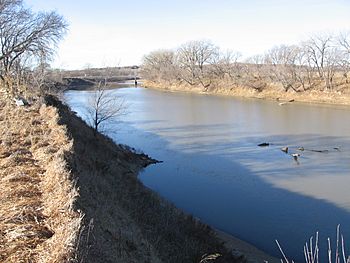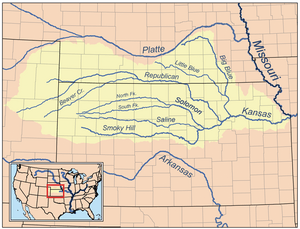Big Blue River (Kansas) facts for kids
Quick facts for kids Big Blue River |
|
|---|---|

Big Blue River above Manhattan, Kansas
|
|

Map of the Kansas River drainage basin showing the Big Blue and Little Blue rivers
|
|
| Native name | Great Blue Earth River |
| Country | United States |
| State | Nebraska, Kansas |
| Region | Great Plains |
| Cities | Manhattan, KS, Beatrice, NE, Crete, NE, Seward, NE |
| Physical characteristics | |
| Main source | Near Aurora, NE, Great Plains, United States 40°57′00″N 098°04′31″W / 40.95000°N 98.07528°W |
| River mouth | Kansas River Near Manhattan, Great Plains, United States 39°11′17″N 096°31′40″W / 39.18806°N 96.52778°W |
| Length | 359 mi (578 km), South |
| Basin features | |
| River system | Kansas River watershed |
| Tributaries |
|
The Big Blue River is the largest tributary of the Kansas River. A tributary is a smaller river or stream that flows into a larger one. This river is about 359 miles (578 km) long.
It starts in central Nebraska and flows south into Kansas. The Big Blue River joins the Kansas River near Manhattan.
The Kansa Native American tribe gave the river its name. They lived near the river's mouth from 1780 to 1830. They called it the Great Blue Earth River.
Where the River Flows
The Big Blue River mostly flows through farmland. Many farms use its water for their crops.
Some of the bigger towns along the river include:
Sharing the Water
The states of Nebraska and Kansas have an agreement about using the river's water. Nebraska can use the river's water freely for most of the year.
However, from May 1 to September 30, Nebraska must let a certain amount of water flow into Kansas. This helps make sure both states have enough water. So far, there has been no shortage of water in the river.
Images for kids
-
Big Blue River south of Tuttle Creek Lake
See also
 In Spanish: Río Big Blue para niños
In Spanish: Río Big Blue para niños
 | Jackie Robinson |
 | Jack Johnson |
 | Althea Gibson |
 | Arthur Ashe |
 | Muhammad Ali |


